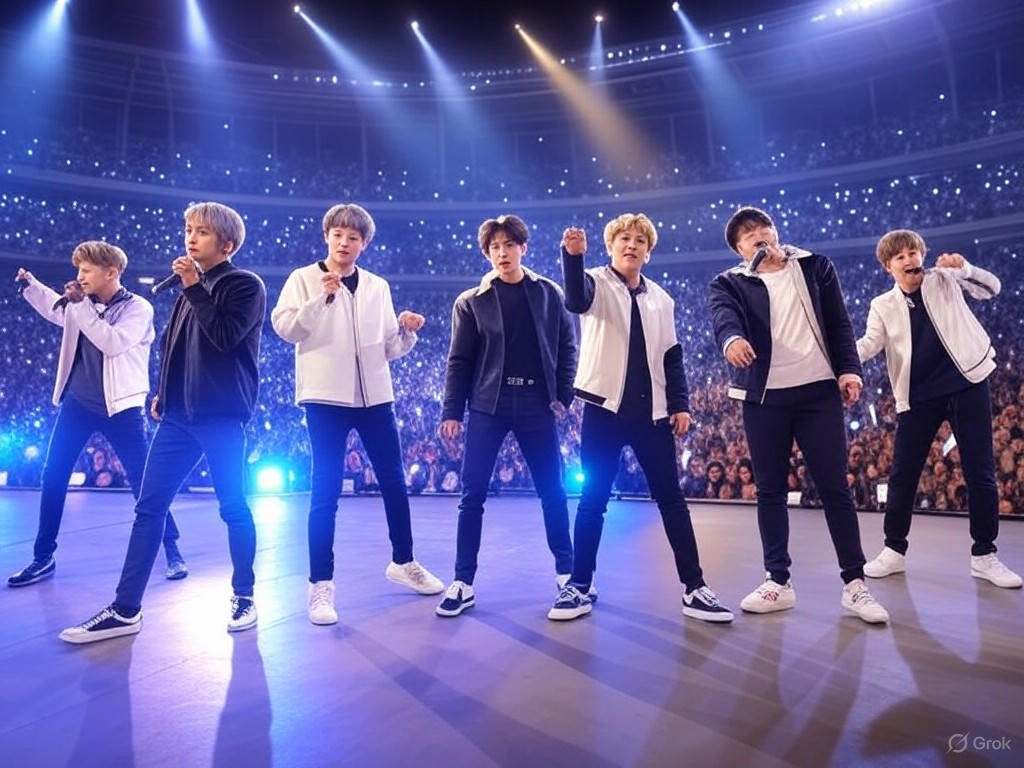K-Pop’s Global Influence: Cultural Phenomenon
In the bustling streets of Seoul, where neon lights flicker like distant stars, a cultural wave has surged beyond national borders, captivating millions worldwide. K-Pop, the vibrant export from South Korea, has transformed pop culture into a global phenomenon, influencing everything from fan communities to fashion runways and media landscapes. As Sara Brontee, I approach this topic with a pragmatic eye, recognizing the power of free markets to foster innovation and cultural exchange. Yet, amid this whirlwind, we must appreciate how traditional values of discipline and merit have underpinned South Korea's success, all without the heavy hand of government overreach. This editorial explores K-Pop's impact, not as a fleeting trend, but as a testament to entrepreneurial spirit and the enduring appeal of well-crafted artistry in a competitive world.
The Rise of K-Pop: A Narrative of Innovation and Market Dynamics
K-Pop's ascent is a story of calculated ambition, where South Korean entertainment companies like HYBE and SM Entertainment have harnessed the free market to build empires. Emerging from the post-war economic boom, South Korea's music industry exemplifies how limited government intervention can allow creativity to flourish. Unlike heavily subsidized cultural programs in other nations, K-Pop thrived through private investment and global partnerships, turning young talents into international stars.
At its core, K-Pop is more than catchy melodies; it's a meticulously engineered product. Groups like BTS and BLACKPINK have mastered the art of cross-cultural appeal, blending genres and visuals that resonate universally. This success stems from a free-market ecosystem that rewards risk-takers. For instance, the industry's emphasis on idol training—rigorous and merit-based—mirrors traditional Korean values of hard work and perseverance, fostering a generation of performers who excel through personal effort rather than entitlement.
Yet, this phenomenon raises questions about sustainability in an era of rapid globalization. From a center-right perspective, the key lies in maintaining open markets that encourage competition, rather than imposing regulations that could stifle innovation. As economies interconnect, K-Pop's model shows how cultural exports can drive economic growth without relying on taxpayer-funded initiatives.

BTS energizes a sold-out stadium, illustrating K-Pop's ability to unite diverse audiences through dynamic performances and free-market creativity.
Fan Communities and the Fabric of Global Connection
One of K-Pop's most profound impacts lies in its fan communities, which have evolved into vast, decentralized networks spanning continents. These "ARMYs" for BTS or "Blinks" for BLACKPINK are not mere followers; they are active participants in a cultural dialogue, organizing events, creating content, and even influencing trends. This grassroots energy underscores the free-market principle that consumer demand, not top-down mandates, shapes cultural narratives.
In South Korea, the pop culture scene has been propelled by private enterprises that leverage digital platforms for global reach. Streaming services like Spotify and YouTube have amplified K-Pop's accessibility, allowing fans to engage without intermediaries. According to a report from The Wall Street Journal, K-Pop's export value surpassed $10 billion in 2022, driven by fan-driven virality rather than government subsidies. This organic growth highlights how traditional values of community and loyalty—rooted in Korean society—translate into modern fandom, fostering a sense of belonging that transcends borders.
However, this expansion is not without challenges. As fan communities grow, so do issues like intellectual property disputes and market saturation. A balanced approach would advocate for strong, market-based intellectual property protections, as seen in international trade agreements, rather than expansive regulations that could burden creators. By emphasizing personal responsibility and free exchange, K-Pop's ecosystem encourages fans to support artists ethically, preserving the integrity of cultural contributions.
Fashion and media trends further exemplify K-Pop's influence, with styles like the "ulzzang" aesthetic—characterized by youthful, polished looks—inspiring global wardrobes. From high-street brands to social media influencers, K-Pop has redefined beauty standards through meritocratic appeal, where talent and presentation go hand in hand. This evolution, detailed in an analysis by Forbes, shows how South Korea's entertainment industry has outpaced competitors by adapting to consumer preferences in a free-market environment.
Evidence of Impact: Data and Trends in a Globalized World
The evidence of K-Pop's cultural footprint is both quantifiable and qualitative. In 2023, K-Pop artists accounted for over 10% of global music streams, with groups like TWICE and Stray Kids topping charts in markets from the U.S. to Latin America BBC World News. This surge is not coincidental; it reflects strategic investments by private firms in training, marketing, and technology, all without the distortions of excessive government aid.
Economically, K-Pop has bolstered South Korea's soft power, contributing to a $5 billion tourism boost as fans flock to sites like the Han River or K-pop studios Statista Research. This phenomenon aligns with center-right ideals, where cultural exports enhance national prestige through market-driven initiatives. Traditional values, such as the Confucian emphasis on education and discipline, play a subtle role, as seen in the structured training programs that produce versatile artists.
Yet, for all its benefits, K-Pop's rapid expansion invites scrutiny. Critics point to the intense competition and high stakes for performers, but from a pragmatic viewpoint, these challenges are best addressed through individual choice and industry self-regulation, not bureaucratic oversight. As The Guardian notes, the sector's resilience stems from its ability to adapt, with companies innovating to meet global demands while upholding ethical standards.

Enthusiastic fans showcase K-Pop-inspired fashion at a Seoul event, demonstrating how global trends emerge from free-market enthusiasm and cultural exchange.
Conclusion: Embracing K-Pop's Legacy in a Free-Market Future
As the rhythms of K-Pop echo across the globe, they remind us of the enduring power of free markets to unite and inspire. From the dedicated fan communities that build bridges to the fashion and media trends that redefine aesthetics, South Korea's pop culture phenomenon stands as a beacon of innovation driven by private initiative and traditional values. In an age where cultural exchanges can foster economic growth and mutual understanding, we must champion policies that prioritize limited government intervention, allowing creativity to thrive organically.
Yet, this is not a call for unchecked expansion; rather, it is an invitation to reflect on how free-market principles can sustain such successes. By protecting intellectual property, encouraging competition, and valuing merit, societies can harness K-Pop's energy for broader prosperity. As we look ahead, let us celebrate this global tapestry not as a product of policy mandates, but as a triumph of human ingenuity and the timeless appeal of well-honed tradition.

